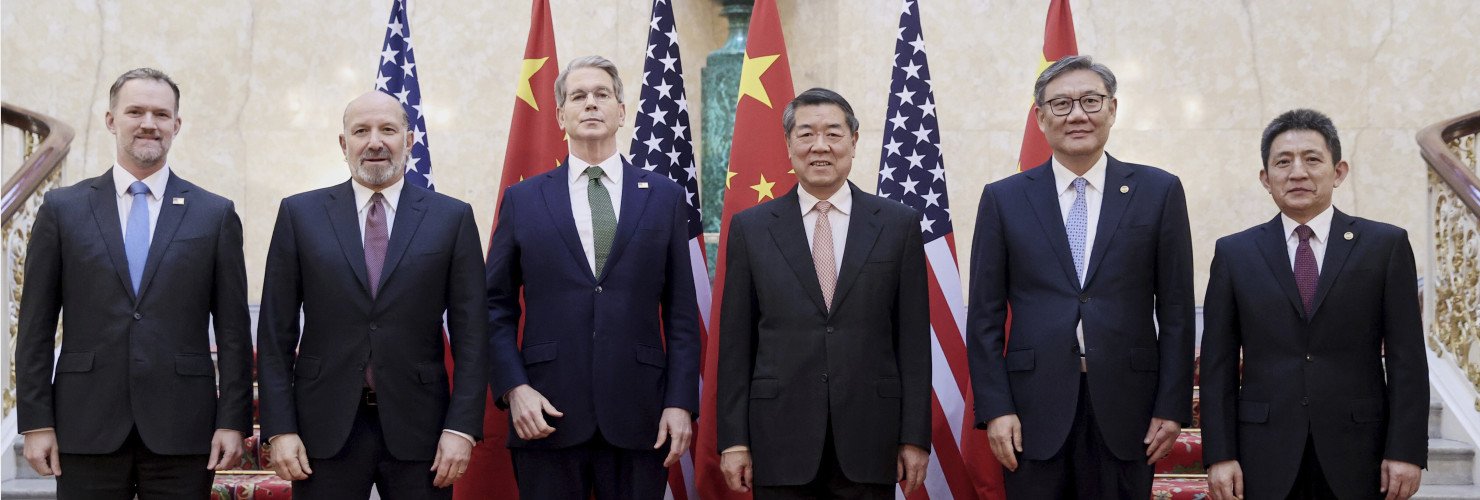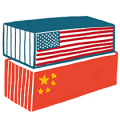

Between China and the US: Challenging times for liberal democracies
In the ongoing conflict between the US and China, liberal democracies are facing historic challenges. Will they have to choose sides? The choice is between a certainty of clear incompatibility with CCP ambitions and values on the one hand, and, on the other, the possibility of a ‘community of shared future’ with a post-Trump America, says MERICS Senior Associate Fellow Charles Parton. Dillying and dallying is a third and worst choice – particularly when it comes to the processing of rare earths.
On 9th May in Geneva, the United States (US) and the People’s Republic of China (PRC) agreed to reduce their respective tariffs by 115% for 90 days. Within a month, this truce in the ‘trade war’ broke down. The recent bilateral trade talks hosted in London on 9th-10th June appear to have restored the Geneva status quo. Although details of the agreement have not been revealed, the Chinese Communist Party (CCP) has seemingly relaxed restrictions of rare earth exports in return for American agreement to remove export bans on certain technologies, ethane (important for plastics) and civil aviation components.
A truce is not a peace treaty. The Geneva agreement may have been shored up until 9th August, but American tariffs of 30% and Chinese tariffs of 10% remain. Donald Trump, President of the US, likes tariffs, and perhaps ones higher than 30%. Moreover, none of the underlying systemic trade issues worrying to both the US and Europe have been addressed.
Broader than a trade war
More pertinently, despite the media’s soubriquet of ‘trade war’, this is a broader, deeper conflict. The ‘win-win’ language of the CCP’s propaganda department is for foreign consumption. Internally, the party talks of a long ‘struggle against hostile forces’; of the science and technology war being more serious than the trade war; of the need to repudiate liberal democratic values, political and economic systems, media and civil society freedoms. As the CCP emphasized in the leaked ‘Document No. 9’ of April 2013, this is an ideological struggle. These elements add up to a geopolitical war; a new Cold War in which the CCP claims that the US is ‘containing and suppressing’ its rise, while in the US there is bipartisan agreement that the PRC is a threat to its global power, interests and values. Both sides are correct. Many third countries fail to recognize this reality.
Neither side emerged from the London talks as a winner. Both have stepped back from the brink – for the time being. The CCP’s legitimacy is largely based upon satisfying the people’s economic aspirations. The economic model is over-reliant on exports. The trade war adds to existing economic problems, especially unemployment. Rising unhappiness among the people could lead to unrest directed at the party, perhaps in a more virulent form than what happened when Covid-19 restrictions became unworkable. Better to retreat and concentrate on the longer-term science and technology war. The power of the PRC’s weaponisation of rare earth exports has become all too plain for the US and its companies, who have suffered the economic consequences.
Countries will be forced to choose sides
This glint of the sword before it was re-sheathed (in the famous expression ‘hide and bide’ [韬光养晦], the first two characters reflect this meaning) was also evident to European and other American allies. The rare earth exports squeeze made the pips squeak in European car and wind power companies. Beijing, whose ‘difficulties’ processing rare earth exports authorisations seemed to disappear after the London truce, doubtless wished to remind the free and open countries that they too would be better advised not to pursue policies inimical to CCP aims.
Liberal democracies will be made to choose sides. Scott Bessent, US Secretary of the Treasury, has warned that: ‘moving towards China would be cutting your own throat.’ The same point was made by Brendan Carr, Chair of the Federal Communications Commission, a few days later. In the recent trade agreement between the United Kingdom (UK) and the US, the UK agreed to ‘work to promptly meet US requirements on the security of the supply chains of steel and aluminium products intended for export to the US.’ If that is the case with metals, it is even more likely in more sensitive high technology areas. Indeed, in a little-noticed memo issued by the White House on 21st February, titled ‘America first investment policy’, two sub-paragraphs demonstrate this pressure to choose. In relation to advanced technology, critical infrastructure and other sensitive areas:
Restrictions on foreign investors’ access to US assets will ease in proportion to their verifiable distance and independence from the predatory investment and technology-acquisition practices of the PRC and other foreign adversaries or threat actors.
This [‘fast-track’] process will allow for increased foreign investment subject to appropriate security provisions, including requirements that the specified foreign investors avoid partnering with United States foreign adversaries.
Unsurprisingly, the Chinese have threatened those who side with America. In April, the Ministry of Commerce was explicit: "It needs to be especially pointed out that China firmly opposes any party reaching deals at the expense of China’s interests. If such a situation occurs, China will absolutely not accept it and will resolutely take countermeasures in equal measure. China has the determination and ability to protect its own interests."
Europeans have fallen out of love with Trump’s America, and some argue that cosying up to the PRC is a viable option. Yet, if the choice is to become a satrapy of one or the other, Europe will go with America. Shared history, culture and values apart, this would be an economic necessity. For both the UK and the European Union (EU), exports of goods and services to the US are around five times those to the PRC. In terms of investment, the figures are far starker. The stock of British investment in the US is around fifty times greater than British investment in the PRC; in the stock of foreign investment in the UK, American investment is over 170 times more than Chinese investment, which represents a mere 0.2%.
Combatting the rare earths weapon
These fundamental dependencies make it more than likely that liberal democracies will come up against the ‘resolute countermeasures’ promised by the CCP, the most effective of which is restricting rare earth exports. That the US and its allies have allowed this to happen is the result of the failure of successful governments to discern the nature of the CCP’s global ambitions and to act on clear warnings. In 2010, the CCP restricted Japan’s access to rare earths over a fishing dispute. 15 years later, the global democracies have done nothing to break the PRC’s near monopoly over the processing of rare earths (‘rare earths’ is a misnomer: they are not rare, but processing has been outsourced to the PRC). Given the vital role of rare earths in modern industries and weaponry, rectifying this economic security and national security weakness is a top priority.
The US and its allies and partners will have to unite in this effort. They should shift towards an industrial policy, something at odds with prevailing beliefs in free and open markets. But this is inevitable, given the ideological and practical clash of Chinese and liberal democratic economic systems. Not least, it means devoting some of the increase in military spending to processing rare earths, since they are a vital component of so many modern weapons.
The CCP is not a ‘black box’ (although leadership politics and how decisions are reached is rarely clear). Party media informs party members about intentions and policies. But whether through woeful or wilful ignorance, many foreign governments and businesses are not willing to confront the reality of what the CCP says in Chinese to party members about its ambitions and its attitudes to democratic ‘hostile foreign forces’. Even if this were not as evident as it is, it would surely be a dereliction of responsible government to leave a country vulnerable to pressure by a power which declares its ideological, political, economic, judicial, media, values and more systems to be in a long-term struggle with those of liberal democracies.
Some may declare that America is moving away from the values of liberal democracies. But Europeans and others will have to choose. That choice is between a certainty of clear incompatibility with CCP ambitions and values on the one hand, and, on the other, the possibility of a ‘community of shared future’ (to cannibalize a phrase) with a post-Trump America. Dillying and dallying is a third and worst choice – particularly when it comes to the processing of rare earths.
This article was first published by The Council on Geostrategy on June 17, 2025. The views expressed in this piece are those of the author.

